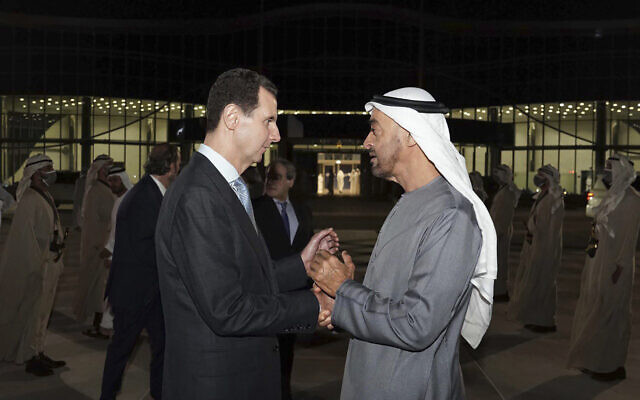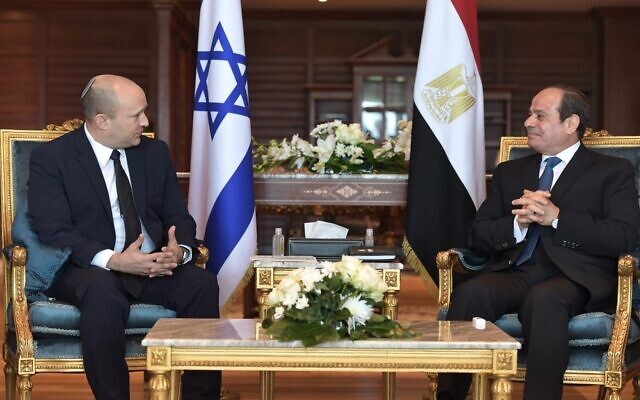Abu Dhabi’s crown prince updated Israeli and Egyptian leaders on Friday’s meeting with Syrian dictator; PM presented vision of regional air defense network
22 March 2022,

Egyptian President Abdel Fattah al-Sissi, Abu Dhabi Crown Prince Sheikh Mohammed bin Zayed al-Nahyan and Israeli Prime Minister Naftali Bennett photographed in Sharm El Sheikh, Egypt March 22, 2022. UAE Ministry of Presidential Affairs/AFP
Syrian President Bashar Assad’s visit to the United Arab Emirates last Friday, where he was hosted by Crown Prince Mohammed bin Zayed al-Nahyan, was discussed on Tuesday during the trilateral summit between al-Nahyan, Israeli Prime Minister Naftali Bennett, and Egyptian President Abdel-Fattah el-Sissi, The Times of Israel has learned.
Bennett, whose office views with concern Assad’s steady return to acceptance in the Arab world, expressed Israel’s position during the meeting in the Sinai resort town of Sharm el-Sheikh.
Al-Nahyan, seen widely as the UAE’s de facto ruler, offered to his counterparts more information on Friday’s visit, which Bennett’s office considers “thought-provoking.”
Still, the prime minister is open to the possibility that there could be positive outcomes for Israel and the region from the visit, if it indicates that the UAE and other regional allies are interested in edging Iran out as one of the dominant players in the country.
Friday’s visit by Assad was harshly condemned by the Biden administration, which has thus far resisted efforts by a growing number of Mideast leaders to normalize the dictator.
The topic of air defense was also a central topic during Tuesday’s meeting. Bennett presented his vision of a regional air defense network, which would include a laser air defense system the prime minister has touted.

In this photo released by the official Facebook page of the Syrian Presidency, Syrian President Bashar Assad, left, speaks with Abu Dhabi’s Crown Prince, Sheikh Mohammed bin Zayed Al Nahyan, in Abu Dhabi, United Arab Emirates, Friday, March 18, 2022. Assad was in the United Arab Emirates on Friday, his office said, marking his first visit to an Arab country since Syria’s civil war erupted in 2011. (Syrian Presidency Facebook page via AP)
The air defense discussion occurred weeks after Houthi rebels in Yemen escalated their drone and missile attacks on the UAE, and days after the Iranian Revolutionary Guard Corps (IRGC) fired off 12 cruise missiles that struck near a US consulate complex in the northern Iraqi city of Erbil.
The three leaders spoke about the IRGC, and the reported possibility that the Biden administration may remove the organization from its list of terrorist organizations, in order to clinch a nuclear deal in Vienna.
On Friday, Bennett and Foreign Minister Yair Lapid issued a joint statement expressing concern over the potential move, saying, “Even now, the IRGC terrorist organization is trying to murder certain Israelis and Americans around the world. Unfortunately, there is still determination to sign the nuclear deal with Iran at almost any cost – including saying that the world’s largest terrorist organization is not a terrorist organization. This is too high a price.”
In response, a US official told The Times of Israel that the US was “prepared to make difficult decisions to return Iran’s nuclear program to JCPOA limits,” not denying that delisting the IRGC was potentially on the table.
Despite the recent suspension of talks, the Bennett-Lapid government still believes a nuclear deal is two-to-three weeks away.
The possibility of bringing the Saudis into the Abraham Accords did not come up during the meeting.
There were several details of the visit that indicated the warmth that Sissi sought to broadcast to Bennett: Israel’s flag was prominently displayed, Bennett was invited to spend a night in Egypt, and Sissi accompanied the prime minister all the way to his plane.
Sissi’s office released a picture of the three leaders, with the Israeli flag clearly visible alongside the Egyptian and Emirati ones.
The summit was initially a secret, and Israel did not bring a government photographer, as it usually does. However, with the meeting made public and pictures issued by the Egyptians, Bennett’s office is happy with the outcome, The Times of Israel learned.
The meeting represents the first-ever trilateral summit of Israeli, Egyptian and Emirati leaders.
In addition to regional issues, there was a focus on bilateral and trilateral cooperation, especially in the fields of trade and tourism.
The trip came days after Israel announced the inauguration of a new flight route between Ben Gurion Airport and the south Sinai resort city. Flights are expected to start as early as next month, during the week of the Passover holiday. The news was widely covered by Israeli media, but was barely mentioned in the Egyptian press.
Israel is working hard to close a free trade agreement with the Emiratis within a matter of weeks. It also recognizes the importance of Israeli tourism to the Egyptians, now that Ukrainian and Russian tourists are not bringing their money to the struggling Egyptian economy.
An Israeli business delegation is slated to travel to Egypt in the near future, The Times of Israel has learned.
The Egyptian statement on the meeting put a different emphasis on the talks. According to Sissi’s office, the three leaders discussed the consequences of “global developments” — likely referring to Russia’s war on Ukraine — on energy, market stability, and food security.
Egypt, the world’s largest wheat importer, receives about 80 percent of its supply from Russia and Ukraine. With wheat prices rising around the globe in the wake of the conflict, Cairo fixed the price of unsubsidized bread in the country on Monday.

Afghan farmers harvest wheat outside Kabul, Afghanistan, June 24, 2010. (AP Photo/Dusan Vranic)
Together, Ukraine and Russia produce around 25% of the world’s wheat. About half of Israel’s supply comes from Ukraine.
Human Rights Watch warned on Monday that the war in Ukraine “risks deepening the world’s food crisis, particularly in the Middle East and North Africa.”
The three leaders also discussed recent developments on a number of international and regional issues. Among those issues, presumably, are the stalled talks on Iran’s nuclear program in Vienna.
Bennett also met with Sissi privately on Monday, shortly after arriving in Sharm el-Sheikh, an Egyptian official told The Times of Israel.
Bennett last met with Sissi in September, in what was the first such summit between Israeli and Egyptian leaders in more than a decade. The premier met with al-Nahyan in December, when he made the first-ever visit by an Israeli prime minister to the Gulf country.
The trilateral summit marks the latest development in the 2020 Abraham Accords, which saw Israel normalize relations with the UAE, Bahrain, and Morocco in agreements brokered by the Trump administration. While the Biden administration so far has been unable to expand those accords, it has put effort into incorporating Egypt and Jordan — which have longstanding but complex ties with Israel — into them.
The normalization agreements have seen the solidification of a bloc of Middle Eastern countries interested in countering Iran’s influence in the region. Tuesday’s meeting comes against the backdrop of the suspended nuclear talks between Iran and world powers in Vienna that are widely believed to be nearing a resolution.

Prime Minister Naftali Bennett (left) and Egyptian President Abdel-Fattah el-Sissi meet, on September 13, 2021, in Sharm el-Sheikh. (Kobi Gideon/GPO)
While Jerusalem vehemently opposes a joint US-Iran return to the agreement officially known as the Joint Comprehensive Plan of Action, Cairo and Abu Dhabi are both seen as more amenable to the deal’s revival. Both are concerned about Iran’s support of proxies throughout the region, but have maintained that Iran is able to race toward a bomb, absent any agreement.
Jacob Magid contributed to this report.



#STEVEN1-
Yes , very noticeable that double chin;. that sylph-like figure has long gone, likely at the same time as his hair.
Bennett is putting some weight!